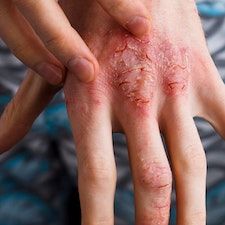Study Demonstrates Efficacy, Safety of Topical PF-07038124 for Eczema, Psoriasis
These new data highlight the importance of larger trials to evaluate the persistence of this treatment’s efficacy and safety seen here.

Topical phosphodiesterase (PF) 4 inhibitor-07038124 treatment of atopic dermatitis (AD) and plaque psoriasis is both efficacious and well-tolerated among patients, according to recent findings.1
The findings were the result of new research conducted to expand upon existing topical medication options for patients with mild-to-moderate AD or psoriasis, especially given the negative systemic adverse events often seen with corticosteroid use.2
The research was led by Lawrence F. Eichenfield, MD, chief of pediatric and adolescent dermatology at Rady Children's Hospital-San Diego and vice-chair of the department of dermatology at UC San Diego’s School of Medicine.
“The aim of this study was to assess the efficacy, safety, tolerability, and pharmacokinetics of topical PF-07038124 in patients with mild to moderate AD or plaque psoriasis,” Eichenfield and colleagues wrote.
Background and Findings
The research team carried out their work at 34 total sites found in 4 countries, with the research lasting from December 2020 - August 2021. The trial was a phase 2a clinical basket study involving subjects that had reported cases of either AD or plaque psoriasis.
The study participants, the team of investigators, and the sponsor study team were blinded for the course of the study up until its conclusion. The treatment (PF-07038124) or a vehicle control was given by the investigators once each day for a total of 6 weeks, and there was a 4 to 5-week safety follow-up meeting schedule.
The subjects were aged 18 - 70 years and had a set of specified body weight and body mass index (BMI) criteria in order to be included in the study. The research team made the AD cohort have a set of criteria requiring 5% - 20% body surface area (BSA) involvement, and the plaque psoriasis cohort had a set of criteria requiring 5% - 15% BSA.
The team determined their primary endpoint for those with AD to be the percentage alteration from the point of baseline in total Eczema Area and Severity Index (EASI) score at the 6-week mark, and the secondary endpoints involved EASI-75 and positive changes in participants’ Investigator’s Global Assessment (IGA) and Peak Pruritus Numerical Rating Scale (PP-NRS) scoring.
For the participants with psoriasis, the investigators determined the primary endpoint to be the alterations from the point of baseline in Psoriasis Area and Severity Index (PASI) score, seen at 6 weeks. Their secondary endpoints were determined to include PASI-75 and improvements in subjects’ scores on the Physician’s Global Assessment (PGA).
The team also looked at demographic data and assessed the observed changes seen from the point of baseline in affected BSA by each meeting they held for both of the condition groups.
Overall, the investigators ended up randomizing 104 individuals, with a noted mean age of 43.0 years and made up 55% of women. They found that, among the subjects, 70 were shown to have AD and 34 had plaque psoriasis, adding that there were generally balanced characteristics at baseline.
The research team reported that at 6 weeks, the groups treated with PF-07038124 showed much greater improvements in their scores on the EASI and PASI systems, as opposed to those in the vehicle arms (EASI: −74.9% vs −35.5%, difference −39.4% [90% CI, −58.8% to −20.1%], P < .001; PASI: −4.8 vs 0.1, difference −4.9 [90% CI, −7.0 to −2.8], P < .001).
The team also noted that treatment-emergent adverse event incidence was found to be comparable between the treatment and vehicle arms of the study for both psoriasis and AD. They added that no application site reactions were found with those given the PF-07038124 treatment.
“The study drug was well tolerated, with no treatment-related TEAEs or application site reactions reported in the PF-07038124 group,” they wrote. “To confirm persistence of efficacy and the safety profile of PF-07038124, long-term data should be collected in larger studies.”
References
- Eichenfield LF, Tarabar S, Forman S, et al. Efficacy and Safety of PF-07038124 in Patients With Atopic Dermatitis and Plaque Psoriasis: A Randomized Clinical Trial. JAMA Dermatol. Published online December 20, 2023. doi:10.1001/jamadermatol.2023.4990.
- Åkerström U, Reitamo S, Langeland T, et al. Comparison of moisturizing creams for the prevention of atopic dermatitis relapse: a randomized double-blind controlled multicentre clinical trial. Acta Derm Venereol. 2015;95(5):587-592.